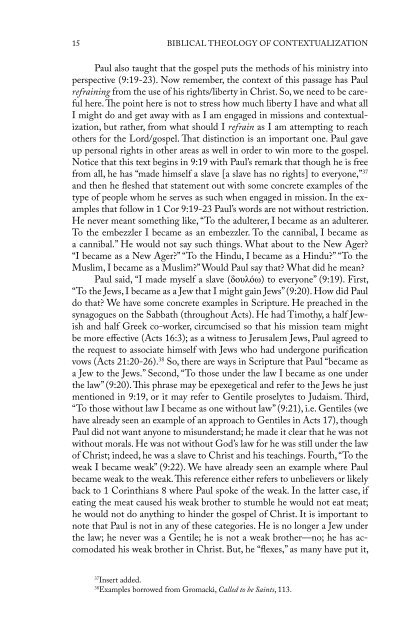The Theology of Missions
The Theology of Missions
The Theology of Missions
You also want an ePaper? Increase the reach of your titles
YUMPU automatically turns print PDFs into web optimized ePapers that Google loves.
15 Biblical <strong>The</strong>ology <strong>of</strong> Contextualization<br />
Paul also taught that the gospel puts the methods <strong>of</strong> his ministry into<br />
perspective (9:19-23). Now remember, the context <strong>of</strong> this passage has Paul<br />
refraining from the use <strong>of</strong> his rights/liberty in Christ. So, we need to be careful<br />
here. <strong>The</strong> point here is not to stress how much liberty I have and what all<br />
I might do and get away with as I am engaged in missions and contextualization,<br />
but rather, from what should I refrain as I am attempting to reach<br />
others for the Lord/gospel. That distinction is an important one. Paul gave<br />
up personal rights in other areas as well in order to win more to the gospel.<br />
Notice that this text begins in 9:19 with Paul’s remark that though he is free<br />
from all, he has “made himself a slave [a slave has no rights] to everyone,” 37<br />
and then he fleshed that statement out with some concrete examples <strong>of</strong> the<br />
type <strong>of</strong> people whom he serves as such when engaged in mission. In the examples<br />
that follow in 1 Cor 9:19-23 Paul’s words are not without restriction.<br />
He never meant something like, “To the adulterer, I became as an adulterer.<br />
To the embezzler I became as an embezzler. To the cannibal, I became as<br />
a cannibal.” He would not say such things. What about to the New Ager?<br />
“I became as a New Ager?” “To the Hindu, I became as a Hindu?” “To the<br />
Muslim, I became as a Muslim?” Would Paul say that? What did he mean?<br />
Paul said, “I made myself a slave (δουλόω) to everyone” (9:19). First,<br />
“To the Jews, I became as a Jew that I might gain Jews” (9:20). How did Paul<br />
do that? We have some concrete examples in Scripture. He preached in the<br />
synagogues on the Sabbath (throughout Acts). He had Timothy, a half Jewish<br />
and half Greek co-worker, circumcised so that his mission team might<br />
be more effective (Acts 16:3); as a witness to Jerusalem Jews, Paul agreed to<br />
the request to associate himself with Jews who had undergone purification<br />
vows (Acts 21:20-26). 38 So, there are ways in Scripture that Paul “became as<br />
a Jew to the Jews.” Second, “To those under the law I became as one under<br />
the law” (9:20). This phrase may be epexegetical and refer to the Jews he just<br />
mentioned in 9:19, or it may refer to Gentile proselytes to Judaism. Third,<br />
“To those without law I became as one without law” (9:21), i.e. Gentiles (we<br />
have already seen an example <strong>of</strong> an approach to Gentiles in Acts 17), though<br />
Paul did not want anyone to misunderstand; he made it clear that he was not<br />
without morals. He was not without God’s law for he was still under the law<br />
<strong>of</strong> Christ; indeed, he was a slave to Christ and his teachings. Fourth, “To the<br />
weak I became weak” (9:22). We have already seen an example where Paul<br />
became weak to the weak. This reference either refers to unbelievers or likely<br />
back to 1 Corinthians 8 where Paul spoke <strong>of</strong> the weak. In the latter case, if<br />
eating the meat caused his weak brother to stumble he would not eat meat;<br />
he would not do anything to hinder the gospel <strong>of</strong> Christ. It is important to<br />
note that Paul is not in any <strong>of</strong> these categories. He is no longer a Jew under<br />
the law; he never was a Gentile; he is not a weak brother—no; he has accomodated<br />
his weak brother in Christ. But, he “flexes,” as many have put it,<br />
37<br />
Insert added.<br />
38<br />
Examples borrowed from Gromacki, Called to be Saints, 113.

















